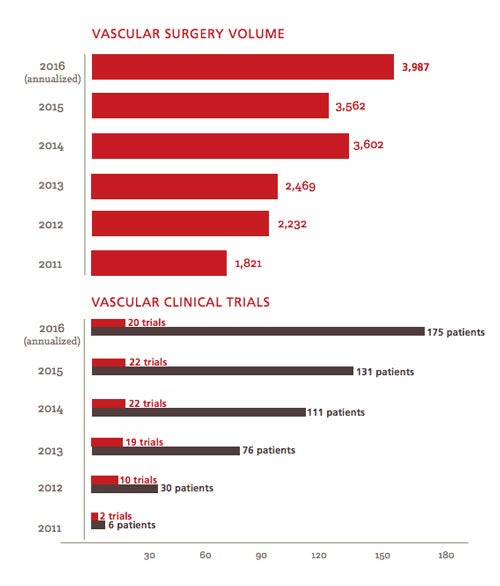Life as a Fellow
Our fellowship is structured to incorporate both clinical and academic responsibilities in both years of training. Abstract and manuscript writing, critical appraisal of literature during conference, national meeting/conference attendance and instruction in vascular laboratory studies are encouraged during fellowship.
Two fellows are selected per year. The first-year fellows clinical responsibilities include:
- Daily inpatient/outpatient care
- Open and endovascular surgery and
- A shared call schedule with the senior fellow and senior integrated resident.
Requirements for Fellows
The vascular service at University Hospitals Cleveland Medical Center is broken down into two smaller services with 2–3 attendings surgeons on each service. The fellow or senior integrated resident will take responsibility for the care of one of the two services while on duty at University Hospitals Cleveland Medical Center. The senior fellow also runs twice weekly conferences composed of scheduled interesting angiographic cases, journal club, morbidity & mortality conference and resident tutorials. All fellows are required to sit for the Vascular Surgery In-Training Exam (VSITE) annually. Fellows perform home-call and have the support of an in-house surgical resident night float team, including a postgraduate year four, a year two and two postgraduate year ones. Home-call duty is typically one night per week and every other or every third weekend. We support one meeting per year which includes attendance to the Society for Clinical Vascular Surgery SCVS meeting for the first-year fellow and the Wesley Moore Course in California for the second-year fellow. Additionally, a dedicated course is attended by our fellows in preparation for the Registered Physician in Vascular Interpretation (RPVI) exam.
Operations and Procedures Performed by Fellows
Fellows operate and provide care at University Hospitals Cleveland Medical Center for most of their training (18 months). Additionally, the first-year fellow spends three months at our Louis Stokes Cleveland VA Medical Center and the second-year fellow spends three months at Ahuja Medical Center. In 2016–2017 academic year the fellows will also rotate on vascular medicine. This will allow focused time to learn interpretation of vascular studies and management of nonoperative vascular disease.
Fellows perform:
- Open abdominal and lower extremity bypass for occlusive disease
- Open thoracoabdominal repairs for aneurysms
- Carotid revascularization
- Hemodialysis access and
- Venous surgery.
Fellows also will be taught the full range of complements to endovascular surgery, including:
- Carotid stenting
- Endograft repair of thoracic and abdominal aortic aneurysm
- Peripheral vascular angioplasty and stenting of renal, mesenteric and lower extremity arteries
- Thrombolysis and
- Venous ablation.
The Division of Vascular Surgery conducts approximately 700 outpatient visits, 170 of which are new patients, annually. We perform approximately 240 major open operations, 470 minor open operations, 100 diagnostic and 150 therapeutic endovascular procedures. Both open and endovascular training are instructed by Vascular Surgeons.
Rotation Schedule
Vascular Surgery Fellowship 5 + 2 Schedule
Vascular Fellow Year 1
| Month | Location |
|---|---|
| July August September October December January February March |
Vascular Surgery at University Hospitals Cleveland Medical Center |
| November | Vascular Medicine at University Hospitals Cleveland Medical Center |
| April May June |
Vascular Surgery at University Hostpitals Ahuja Medical Center |
Vascular Fellow Year 2
| Month | Location |
|---|---|
| July August September |
Vascular Surgery at Louis B. Stokes Cleveland VA Medical Center |
| October November January February March April May June |
Vascular Surgery at University Hospitals Cleveland Medical Center |
| December | Vascular Medicine at University Hospitals Cleveland Medical Center |
Our Fellows
- 2018-2020 Ravi Ambani, MD
- 2017-2019 Anas Abdel Azim, MD
- 2016-2018 Levon Khojayan, MD
- 2015–2017 Jonathan Kwong, MD
- 2014–2016 Hannah Kim, DO
- 2013–2015 Karem Harth, MD, MHS
- 2012–2014 Nathaniel Liu, MD
- 2011–2013 Alexander Chang, MD
- 2010–2012 Constantinos Constantinou, MD
- 2009–2011 Gurjeet Kaleka, MD
- 2008–2010 Justin Boccardo, MD
- 2007–2009 Dennis L. Hsu, MD
- 2006–2007 Rajdeep Sandhu, MD
- 2006–2008 Mirza S. Baig, MD
- 2004–2006 Paul J. Corcoran, MD
- 2003–2005 Virginia Wong, MD
- 2002–2004 Gilberto C. Russo, MD
- 2001–2003 Nishan Dadian, MD
- 2000–2002 Hans A. Brings, MD
- 1999–2001 Giles Pinault, MD
- 1998–2000 James H. Rothstein, MD
- 1997–1999 Jeffrey M. Mendeloff, MD
- 1996–1998 John O. Miller, MD
- 1995–1997 David J. Minion, MD
- 1994–1996 Robert J. Pitsch, MD
- 1991–1993 R.R.Rao, MD
How to Apply
Application deadline
Applications accepted December 03, when Electronic Residency Application Service (ERAS) opens.
Application process
More information on the application process can be obtained by contacting Meggi Lensman.
Meggi Lensman, MBA
Academic Residency Program Coordinator
Department of Surgery
University Hospitals Cleveland Medical Center
11100 Euclid Ave.
Cleveland, Ohio 44106
216.844.1323
meggi.lensman@uhhospitals.org
Position availability
As of 2019/2020, two fellows will be selected every year after the completion of the formal application and interview process. Candidates for the fellowship typically apply two years before entering the training program.
Interview dates
- Wednesday, January 23, 2019
- Friday, February 22, 2019
Application requirements
Candidates for the fellowship program must complete a full residency in general surgery leading to American Board of Surgery certification or board eligibility by the start of the fellowship.
- All Vascular Surgery Fellowship candidates must have completed an Accreditation Council for Graduate Medical Education (ACGME)-accredited general surgery residency
- Completed Common Application Form (CAF) through Electronic Residency Application Service (ERAS)
- Curriculum vitae
- Current photograph
- Personal statement
- Three letters of recommendation


